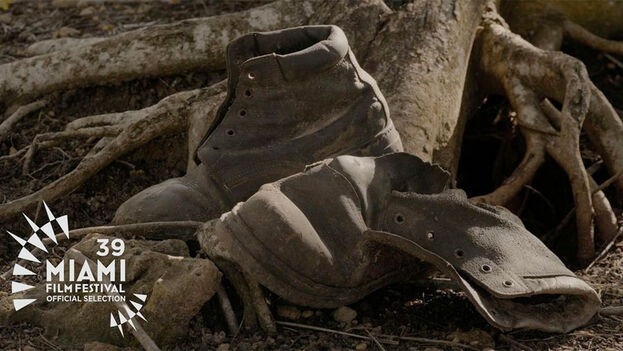
![]() 14ymedio, Yoani Sanchez, Havana, 13 March 2022 — “How can they define you with the opposite of what you are?” asks a Cuban labeled as a “mercenary” by official propaganda after being part of the 2506 Brigade. His voice, together with that of several protagonists of the battle of Bahía de Cochinos – the Bay of Pigs — is heard in the documentary Veritas that just premiered at the Miami Film Festival.
14ymedio, Yoani Sanchez, Havana, 13 March 2022 — “How can they define you with the opposite of what you are?” asks a Cuban labeled as a “mercenary” by official propaganda after being part of the 2506 Brigade. His voice, together with that of several protagonists of the battle of Bahía de Cochinos – the Bay of Pigs — is heard in the documentary Veritas that just premiered at the Miami Film Festival.
The audiovisual, directed by the filmmaker Eliécer Jiménez-Almeida, proposes to look at that April 1961 from another angle, when hundreds of exiles tried to reach the Island and reverse the authoritarian drift of the Revolution. The defeat not only meant hundreds of deaths and more than a thousand prisoners, but also that the Cuban regime could write the history as it pleased.
Thus, several generations grew up with only one version of the events, loaded with stigmas against those who joined the war, frightened by the executions, the confiscations of properties and the delusions of Fidel Castro after coming to power in 1959. Veritas allows them to speak in front of to the camera, as they have never been able to do in the Island’s media.
With an intact Cubanness and without resorting to too many adjectives in their descriptions, several of the participants in the conflict detail the training in Guatemala, the haphazard landing, the moments in which they thought they were close to victory, the anguish when ammunition began to run out and the betrayal that they blame on President John F. Kennedy for not supporting them at the decisive moment.
In more than an hour, testimonies are interspersed that complete the chronology of the battle, an impeccable selection of archive material and current footage from the scene. Jiménez-Almeida reconstructs the other side of the story, as he discovers it, given that the filmmaker was born in 1983 in Cuba and grew up listening only to the official script of what happened.
The documentary sustains that rhythm of discovery, of exploration that brings to light what has been hidden for decades and is indebted to investigative journalism that avoids staying in common places or coined certainties. Perhaps for this reason, the choice of the title, the Latin name of the Roman goddess of Truth, already prepares the viewer for what is to come.
For example, the name used for the place of combat marks the speaker’s position. Castro never liked to refer to “Bay of Pigs,” probably because of its degrading connotations, so he preferred to use the place name of Playa Girón, a word with infinite possibilities of rhyme; and in addition he skillfully attached the slogan “the first defeat of imperialism in America.”
In that confrontation, the elements of the official narrative that would later be used in the face of each internal and external incident crystallized, the lines on which part of the subsequent Cuban political discourse ran were oiled: little David facing the Goliath of the North; labeling critics as mercenaries at the service of a foreign power; and raising the sovereignty of national soil to a sacred level that could even justify the violation of the sovereignty of the citizen.
That story was so effective that still today, people who cannot even point to the scene of the conflict on a map repeat the version at face value. Therefore, it has double merit that the person directing the documentary is a Cuban totally immersed in the institutional view of what happened, and he turns everything he was taught in school upside down.
“Fighting for the freedom of your country is not a duty or an obligation. Fighting for the freedom of your country is a privilege,” affirms another of the interviewees, his voice breaking. Showing the complexity, the nuances and all the parts of such a defining event is also more than a responsibility, it is a personal and artistic benefit, which Jiménez-Almeida assumes maturely and without fanfare.
Veritas provokes the need for another documentary: the one in which the voices of one side and the other intertwine to give shape to the full face of a battle. A conflict that six decades later continues to be one of the most manipulated and unknown passages in our history.
____________
COLLABORATE WITH OUR WORK: The 14ymedio team is committed to practicing serious journalism that reflects Cuba’s reality in all its depth. Thank you for joining us on this long journey. We invite you to continue supporting us by becoming a member of 14ymedio now. Together we can continue transforming journalism in Cuba.
